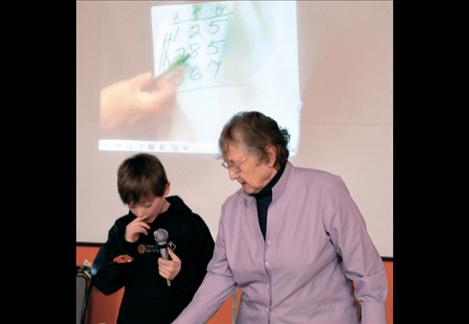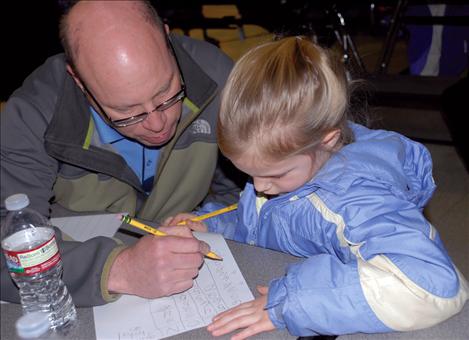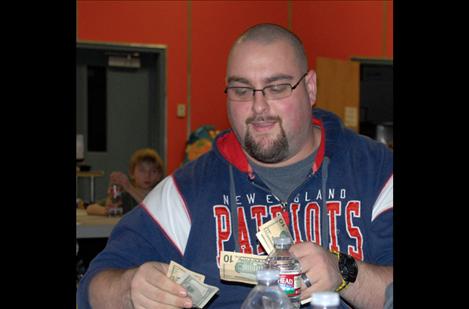Ms. Math makes mathematics marvelous
Hey savvy news reader! Thanks for choosing local.
You are now reading
1 of 3 free articles.
POLSON — “I grew up before television,” said Ms. Math to a group of second through fourth grade students and their parents.
The idea of no television caused “ohs” of surprise and big eyes from the kids.
“What do you think I did with no video games to play?” asked Ms. Math.
Answers flew across the cafeteria at Linderman School: backgammon, checkers, chess, “older board games,” Monopoly and card games, such as cribbage and Old Maid.
“Counting for cribbage taught me my math facts,” Ms. Math said, since crib players count pairs of cards that equal 15.
Ms. Math, alias Rachel McAnallen, has been an educator for 55 years and earned her Ph.D. at age 75. From Storrs, Conn., Ms. Math came to Polson and Pablo for an intensive two days, showing educators a conceptual way of teaching math and “playing math” with kids.
Ms. Math spent four hours with 50 reservation teachers on Feb. 17, and then spoke to teachers in training and Pablo teachers at Salish Kootenai College. She whirled through Linderman School, Pablo Elementary School, Polson Middle School, grades K-8. Then the next day, Ms. Math topped off her visit with a two-hour talk about math and new ways of teaching math.
“A conceptual way of teaching math” doesn’t tell a reader much about Ms. Math’s style.
To demonstrate the concept, she began by having a parent count some paper money. He sorted the bills, counted the larger bills first and then the small bills.
That’s how math should be, Ms. Math said; numbers should be treated like money.
For instance, to add 32, 13, 26 and 27, people who attended school when she did — and for a long time afterwards — would simply put the numbers in a column, add the 1’s column first, carry a number and then add the 10’s column.
There is not a mathematical term called “carrying,” Ms. Math said. Instead, she arranged the numbers into 10s and ones and then added the 10s first:
30 + 2
10 + 3
20 + 6
20 + 7
80 + 10 + 8 = 98
This math, besides making more sense, McAnallen said, readies kids for algebra, which is always worked from left to right.
Subtraction uses the same idea, subtracting the numbers, beginning with the 10s:
75 70 + 5
— 39 30 + 9
40 + (-4) = 36
The same principle applies to multiplication:
14 = 10 + 4
X 5 X 5
50 + 20 = 70
“We are educating your child for the future,” Ms. Math said, telling parents to add 10 or 15 years to their student’s age, the age when they will likely be entering the workforce.
She also cautioned parents not to say this wasn’t the way they learned math.
Linderman Principal Tim Finkbeiner agreed.
“The hope of this school is the kids will come home and teach you,” he said.
After Ms. Math’s presentation, one dad said, “(This way of teaching) would have made math a whole lot easier.”
Polson Gifted and Talented teacher Tamara Fisher said the Polson district, other reservation schools and SKC have supported Ms. Math’s visits. Ms. Math also has done at least two summer sessions for educators, the most recent one on how to teach fractions.
“It’s at least the fifth time Rachel has been on this reservation,” said Fisher. “We want it to be a long term relationship.”
Most of Ms. Math’s trips to the Flathead Reservation were funded through the National Security Agency, thanks to Polly Dupuis, Polson High School and Salish Kootenai College teacher, who connected with the NSA during a sabbatical and found the funding.
The NSA program has been operating on the reservation for three years and also includes monthly math circles, where teachers from all reservation schools gather and discuss teaching mathematics. Some funds also comes from the University of Montana, Dupuis said.


















